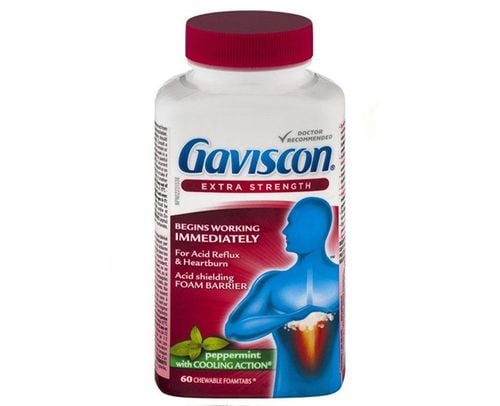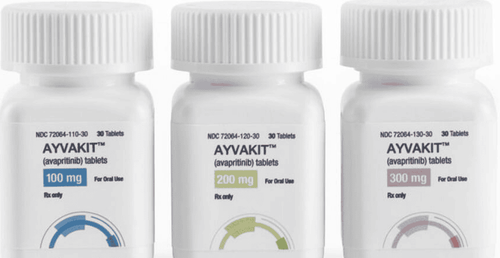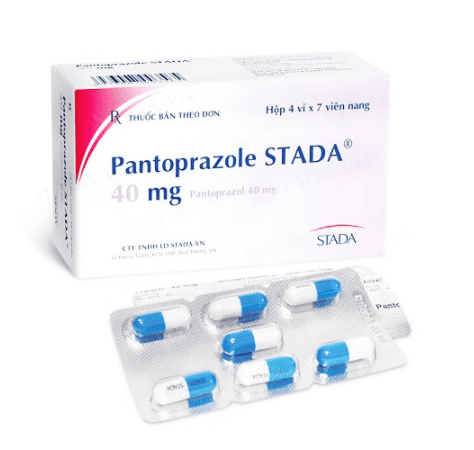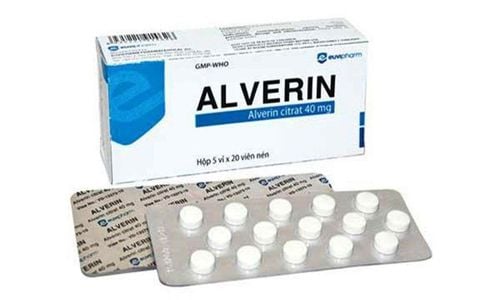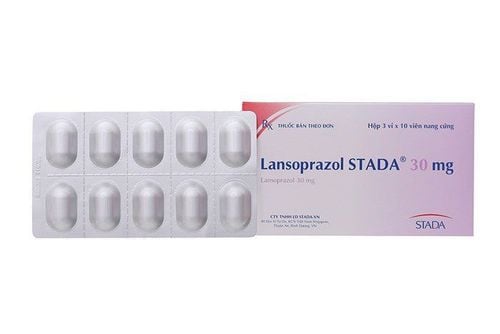This is an automatically translated article.
Lansoprazole belongs to a class of drugs called proton pump inhibitors (PPIs), which are used to treat certain stomach and esophageal problems (such as heartburn, heartburn, stomach ulcers, and prevent cancer) esophagitis...).1. What does Lansoprazole do?
Lansoprazole is commonly used to treat certain stomach and esophagus problems (such as gastroesophageal reflux disease, stomach ulcers). Lansoprazole works by reducing the amount of acid in the stomach, which in turn relieves symptoms such as heartburn, difficulty swallowing, and a persistent cough. Lansoprazole also helps heal acid damage in the stomach and esophagus, helping to prevent ulcers and esophageal cancer.Many people take over-the-counter Lansoprazole products to self-treat frequent heartburn (lasting 2 or more days). However, Lansoprazole does not relieve heartburn immediately, it can take 1-4 days to work.
Note:
For over-the-counter products, carefully read the instructions and ingredients on the package to choose the right medicine. The manufacturer may have changed some ingredients, or products with similar brand names may contain different ingredients. Using the wrong product can affect your health. Lansoprazole is not recommended for use in children under 1 year of age due to the increased risk of serious side effects.

Thuốc Lansoprazole thường được chỉ định để điều trị bệnh dạ dày, thực quản
2. Dosage and usage
Lansoprazole is usually taken by mouth as directed by your doctor. Dosage is usually 1 time per day, before meals. Dosage is based on the patient's medical condition, age, and response to treatment. Dosage for children is also based on age and weight. Do not increase your dose on your own or take Lansoprazole more often than directed. If you are self-treating, follow all instructions on the medicine packaging. When taking, swallow the tablet whole. Avoid crushing or breaking the tablet. If you have trouble swallowing the tablet, you can open the capsule and sprinkle the powder on soft food (yogurt, apple sauce...) and swallow the mixture whole without chewing. Or mix the powder with a small amount of juice (about 60ml), stir well and drink the mixture immediately without each other. Then rinse the glass with water and drink again to make sure you've finished the dose. Do not prepare the mixture for later drinking, as doing so may affect the effectiveness of the drug. If you are taking Lansoprazole through a nasogastric tube (nasogastric tube), ask your doctor for detailed instructions on how to mix and use it correctly. If necessary, Lansoprazole can be given with an antacid. If you are also taking Sucralfate, take Lansoprazole at least 30 minutes before taking Sucralfate. Keep taking Lansoprazole exactly as prescribed to get the most benefit from it, even if you feel better. To make it easier to remember the dosing schedule, take your pills at the same time each day. If you are self-treating with over-the-counter Lansoprazole, do not take it for more than 14 days unless directed by your doctor. If your condition persists or tends to worsen, let your doctor know if your heartburn persists after 14 days or you need to take more medication. It's important to note that the risk of side effects increases over time, so ask your doctor about the right time to take your medication.
Sau 14 ngày sử dụng thuốc Lansoprazole chứng ợ nóng của bạn vẫn tiếp diễn cần thông báo cho bác sĩ biết
3. Undesirable effects
Like many other drugs, Lansoprazole can also bring some side effects such as diarrhea, stomach pain or headache. Tell your doctor if you have any serious side effects such as: signs of low blood magnesium levels (such as fast, slow or irregular heartbeat, persistent muscle spasms, seizures); signs of lupus (such as a rash on the nose and cheeks, new or worsening joint pain). Get medical help if you experience serious reactions such as: unusually fast heartbeat, bloody or black stools, fainting, vomiting of vomit that looks like coffee grounds, enlarged pupils, changes in vision (blurred vision...), convulsions, eye swelling/pain/redness. In very rare cases, Lansoprazole can cause serious intestinal infections caused by C. difficile bacteria. This condition may occur while taking the drug or weeks to months after stopping treatment. Tell your doctor right away if you experience: diarrhea that doesn't stop, abdominal pain, cramps, fever, blood, or mucus in your stool. If you have these symptoms, do not take anti-diarrheal medicines or opioids as they can make the symptoms worse. In rare cases, proton pump inhibitors (such as Lansoprazole) cause vitamin B12 deficiency. The risk increases if they are taken daily for a long time (3 years or longer). Tell your doctor right away if you develop symptoms of vitamin B12 deficiency (such as unusual weakness, sore tongue or numbness, tingling in the hands or feet).4. Caution
Before taking Lansoprazole, be aware of the following:If you are allergic to Lansoprazole or to similar drugs (such as Dexlansoprazole, Omeprazole, Pantoprazole), tell your doctor right away; Talk to your doctor about your patient's medical history, especially liver disease, lupus erythematosus. Some symptoms after taking the pill could be a sign of a more serious condition. Get medical help right away if you have: heartburn with sweating, dizziness, chest pain, jaw pain, arm pain, shoulder pain (especially unusual sweating, trouble breathing), feeling difficulty (or pain) swallowing food, vomiting blood, vomit that looks like coffee grounds, bloody or black stools, heartburn for more than 3 months, unexplained weight loss, frequent chest pain, wheezing frequent (especially heartburn), nausea, vomiting, stomach pain. Proton pump inhibitors (such as Lansoprazole) may increase the risk of fracture, especially with long-term, high-dose use and in the elderly. Talk to your doctor about ways to prevent bone loss, such as calcium supplements (such as Calcium citrate) and vitamin D. Older adults may be more sensitive to the side effects of Lansoprazole. especially bone loss and fracture and C. difficile infection. For women who are pregnant, Lansoprazole should only be used when absolutely necessary. Discuss the benefits and risks with your doctor before taking the medication. For women who are breastfeeding, it is not known whether Lansoprazole passes into breast milk. The effect of the drug on the nursing infant is unknown, consult your doctor before breast-feeding.

phụ nữ đang mang thai chỉ sử dụng thuốc Lansoprazole theo chỉ định của bác sĩ
5. Drug interactions
Some drugs that may react with Lansoprazole include: Methotrexate (especially with high dose treatment). Some medications need stomach acid so the body can absorb them properly. Lansoprazole reduces stomach acid, so it may change how other products work. Some affected drugs may include: Ampicillin, Atazanavir, Erlotinib, Nelfinavir, Pazopanib, Rilpivirine, some azole antifungals (Itraconazole, Ketoconazole, Posaconazole). Lansoprazole is very similar to Dexlansoprazole so do not use medicine containing the active ingredient Dexlansoprazole while using Lansoprazole. Lansoprazole may affect the results of some tests causing false results. Make sure the testing staff and your doctor know you are using this medicine.6. Some Notes
Overdose : If Lansoprazole overdose and symptoms such as fainting or difficulty breathing, the patient should be taken to the emergency room immediately. Do not share this prescription with others. In addition, patients are encouraged to undergo regular physical examination, including medical tests such as magnesium blood tests, vitamin B12 levels, etc. to monitor progress and note side effects. Missed dose: If you miss a dose, take it as soon as you remember. If it is almost time for your next dose, skip the missed dose and do not double your dose. Storage: Store Lansoprazole at room temperature, away from light and moisture. Do not store medicine in the bathroom, keep it out of the reach of children and the range of pets.Please dial HOTLINE for more information or register for an appointment HERE. Download MyVinmec app to make appointments faster and to manage your bookings easily.
Reference source: Webmd



